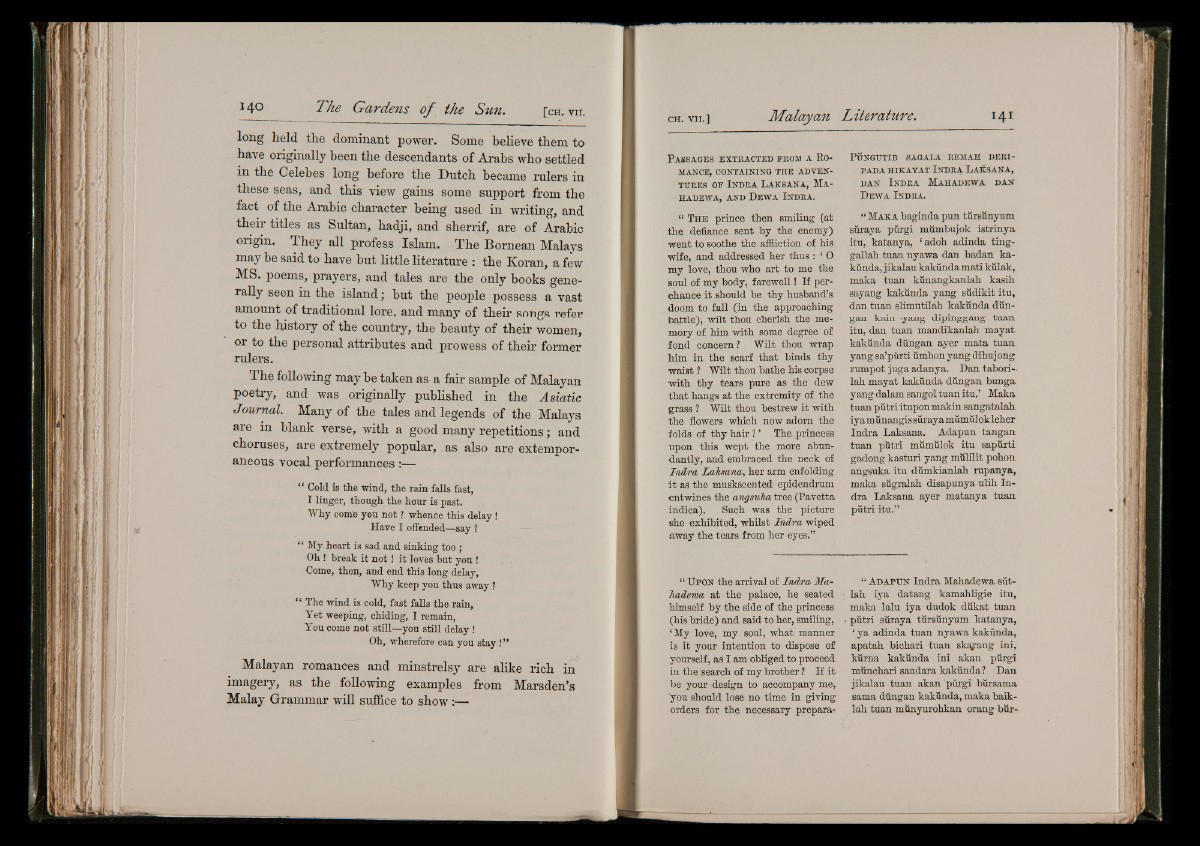
long held the dominant power. Some believe them to
have originally been the descendants of Arabs who settled
in the Celebes long before the Dutch became rulers in
these seas, and this view gains some support from the
fact of the Arabic character being used in writing, and
their titles as Sultan, hadji, and sherrif, are of Arabic
origin. They all profess Islam. The Bornean Malays
may be said to have but little literature : the Koran, a few
MS. poems, prayers, and tales are the only books generally
seen in the island; but the people possess a vast
amount of traditional lore, and many of their songs refer
to the history of the country, the beauty of their women,
or to the personal attributes and prowess of their former
rulers.
The following may be taken as a fair sample of Malayan
poetry, and was originally published in the Asiatic
Journal. Many of the tales and legends of the Malays
are in blank verse, with a good many repetitions; and
choruses, are extremely popular, as also are extemporaneous
vocal performances:—
“ Cold is the wind, the rain falls fast,
I linger, though the hour is past.
Why come you not ? whence this delay !
Have I offended—say ?
“ My heart is sad and sinking too ;
Oh ! break it n o t! it loves but you !
Come, then, and end this long delay,
Why keep you thus away ?
“ The wind is cold, fast falls the rain,
Yet weeping, chiding, I remain,
You come not still—you still delay !
Oh, wherefore can you stay ! ”
Malayan romances and minstrelsy are alike rich in
imagery, as the following examples from Marsden’s
Malay Grammar will suffice to show :—
P a s s a g e s e x t r a c t e d f r o m a R om
a n c e , CONTAINING THE ADVENTURES
OF I n d r a L a k s a n a , M a -
HADEWA, AND D EW A IN DRA .
“ The prince then smiling (at
the defiance sent by the enemy)
went to soothe the affliction of his
wife, and addressed her thus : ‘ O
my love, thou who art to me the
soul of my body, farewell! If perchance
it should be thy husband’s
doom to fall (in the approaching
battle), wilt thou cherish the memory
of him with some degree of
fond concern? Wilt thou wrap
him in the scarf that binds thy
waist ? Wilt thou bathe his corpse
with thy tears pure as the dew
that hangs at the extremity of the
grass ? Wilt thou bestrew it with
the flowers which now adorn the
folds of thy hair 1 ’ The princess
upon this wept the more abundantly,
and embraced the neck of
Indra Laksana, her arm enfolding
it as the muskscented epidendrum
entwines the angsuka tree (Pavetta
indica). Such was the picture
she exhibited, whilst Indra wiped
away the tears from her eyes.”
PÜN G UT IB SAGALA REM AH D E R IVADA
h i k a y a t I n d r a L a k s a n a ,
d a n I n d r a M a h a d e w a d a n
D e w a I n d r a .
“ Maka baginda pun tursunyum
süraya pürgi mümbujok istrinya
itu, katanya, ‘adoh adinda ting-
gallah tuan nyawa dan badan kakünda,
jikalau kakünda mati kulak,
maka tuan kunangkanlah kasih
sayang kakünda yang südikit itu,
dan tuan slimutilah kakünda dün-
gan kain -yang dipinggang tuan
itu, dan tuan mandikanlah mayat
kakünda düngan ayer mata tuan
yang sa’pürti ümbon yang dihujong
rumpot juga adanya. Dan tabori-
lah mayat kakünda düngan bunga
yang dalamsangol tuan itu.’ Maka
tuan pütri ituponmakin sangatalah
iyamünangis süraya mümülokleher
Indra Laksana. Adapun tangan
tuan pütri mümülok itu sapürti
gadong kasturi yang mülilit pohon
angsuka itu dümkianlah rupanya,
maka sügralah disapunya ulih Indra
Laksana ayer matanya tuan
pütri itu.”
“ Upon the arrival of Indra Ma-
Tiadewa at the palace, he seated
himself by the side of the princess
(his bride) and said to her, smiling,
‘My love, my soul, what manner
is it your intention to dispose of
yourself, as I am obliged to proceed
in the search of my brother ? If it
be your design to accompany me,
you should lose no time in giving
orders for the necessary prepara-
“ Adapijn Indra Mahadewa süt-
lah iya datang kamahligie itu,
maká lalu iya dudok dükat tuan
pütri süraya türsünyum katanya,
‘ ya adinda tuan nyawa kakünda,
apatah bichari tuan sk^ang ini,
küma kakünda ini akan pürgi
münchari saudara kakünda? Dan
jikalau tuan akan pürgi bürsama
sama düngan kakünda, maka baik-
lah tuan münyurohkan orang bür